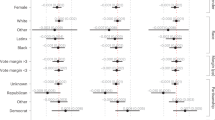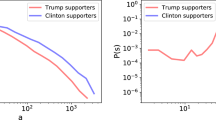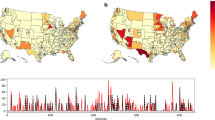Abstract
Digital technologies can augment civic participation by facilitating the expression of detailed political preferences. Yet, digital participation efforts often rely on methods optimized for elections involving a few candidates. Here we present data collected in an online experiment where participants built personalized government programmes by combining policies proposed by the candidates of the 2022 French and Brazilian presidential elections. We use this data to explore aggregates complementing those used in social choice theory, finding that a metric of divisiveness, which is uncorrelated with traditional aggregation functions, can identify polarizing proposals. These metrics provide a score for the divisiveness of each proposal that can be estimated in the absence of data on the demographic characteristics of participants and that explains the issues that divide a population. These findings suggest that divisiveness metrics can be useful complements to traditional aggregation functions in direct forms of digital participation.
This is a preview of subscription content, access via your institution
Access options
Access Nature and 54 other Nature Portfolio journals
Get Nature+, our best-value online-access subscription
$29.99 / 30 days
cancel any time
Subscribe to this journal
Receive 12 digital issues and online access to articles
$119.00 per year
only $9.92 per issue
Buy this article
- Purchase on Springer Link
- Instant access to full article PDF
Prices may be subject to local taxes which are calculated during checkout





Similar content being viewed by others
Data availability
The datasets collected during the current study are deposited in Harvard Dataverse at https://dataverse.harvard.edu/dataset.xhtml?persistentId=doi:10.7910/DVN/8E0EA4. The datasets used for validation of our metric of divisiveness are publicly available on Preflib.org and can be found at https://www.preflib.org/dataset/00014 and https://www.preflib.org/dataset/00006.
Code availability
Data were collected via two digital democracy systems released in Brazil and France preceding their respective 2022 Presidential Elections. The code used to create these platforms is available at https://github.com/CenterForCollectiveLearning/opencracia. Data analysis was conducted using Python (v.3.10.8), and regression analysis was conducted using R (v.4.2.1). Our pipeline includes the use of Pandas (v.1.5.1), NumPy (v.1.23.4) and SciPy (v.1.9.3). The algorithms for implementing divisiveness and aggregation functions are publicly available on the Comchoice library at https://github.com/CenterForCollectiveLearning/comchoice/. To further validate our metric of divisiveness, we also collected third-party data from Preflib.org, a comprehensive resource maintained by the Computational Social Choice community.
References
Hidalgo, C. A. Chile: web poll sifts policies amid riot, rallies and curfews. Nature 575, 443–443 (2019).
Small, C., Bjorkegren, M., Erkkilä, T., Shaw, L. & Megill, C. Polis: scaling deliberation by mapping high dimensional opinion spaces. Recerca https://doi.org/10.6035/recerca.5516 (2021).
Hsiao, Y.-T. et al. vTaiwan: an empirical study of open consultation process in Taiwan. Preprint at SocArXiv https://doi.org/10.31235/osf.io/xyhft (2018).
Royo, S., Pina, V. & Garcia-Rayado, J. Decide Madrid: a critical analysis of an award-winning e-participation initiative. Sustainability 12, 1674 (2020).
Pina, V. et al. Decide Madrid: a Spanish best practice on e-participation. In Engaging Citizens in Policy Making (eds Randma-Liiv, T. & Lember, V.) Ch. 11, 152–165 (Edward Elgar Publishing, 2022).
Semaan, B. et al. Designing political deliberation environments to support interactions in the public sphere. In Proc. 33rd Annual ACM Conference on Human Factors in Computing Systems (eds Begole, B. et al.) 3167–3176 (Association for Computing Machinery, 2015); https://dl.acm.org/doi/proceedings/10.1145/2702123
Aragón, P. et al. Interactive discovery system for direct democracy. In 2018 IEEE/ACM International Conference on Advances in Social Networks Analysis and Mining (ASONAM) (eds Brandes, U. et al.) 601–604 (IEEE, 2018).
Hidalgo, C. A. & Calvo, P. Los albores de la democracia digital. Recerca https://doi.org/10.6035/recerca.6113 (2021).
Noveck, B. S. & Cerf, V. G. Digital democracy: past, present, future an interview with Vinton G. Cerf vice president and chief internet Evangelist, Google. Digit. Gov. 1, 1–10 (2020).
Peixoto, T. e-Participatory budgeting: e-Democracy from theory to success? SSRN https://doi.org/10.2139/ssrn.1273554 (2008).
Gilman, H. R. & Peixoto, T. C. Digital participation. In Handbook of Democratic Innovation and Governance (eds Elstub, S. & Escobar, O.) 105–118 (Edward Elgar Publishing, 2019).
Castells, M. Networks of Outrage and Hope: Social Movements in the Internet Age (John Wiley & Sons, 2015).
Tufekci, Z. Twitter and Tear Gas: The Power and Fragility of Networked Protest (Yale Univ. Press, 2017).
Salesses, P., Schechtner, K. & Hidalgo, C. A. The collaborative image of the city: mapping the inequality of urban perception. PLoS ONE 8, e68400 (2013).
Awad, E. et al. The moral machine experiment. Nature 563, 59–64 (2018).
Salganik, M. J. & Levy, K. E. C. Wiki surveys: open and quantifiable social data collection. PLoS ONE 10, e0123483 (2015).
Brams, S. J. & Sanver, M. R. Voting systems that combine approval and preference, in The Mathematics of Preference, Choice and Order: Essays in Honor of Peter C. Fishburn (eds Brams, S. J. et al.) 215–237 (Springer, 2009).
Arrow, K. J. A difficulty in the concept of social welfare. J. Polit. Econ. 58, 328–346 (1950).
Arrow, K. J. Social Choice and Individual Values (Yale Univ. Press, 1951).
List, C. in The Stanford Encyclopedia of Philosophy (eds Zalta, E. N. & Nodelman, U.) (Metaphysics Research Lab, Stanford Univ., 2022); https://plato.stanford.edu/contents.html
Baldassarri, D. & Page, S. E. The emergence and perils of polarization. Proc. Natl Acad. Sci. USA 118, e2116863118 (2021).
Kubin, E. & von Sikorski, C. The role of (social) media in political polarization: a systematic review. Ann. Int. Commun. Assoc. 45, 188–206 (2021).
Klein, E. Why We’re Polarized (Simon and Schuster, 2020).
Waller, I. & Anderson, A. Quantifying social organization and political polarization in online platforms. Nature 600, 264–268 (2021).
Prior, M. Media and political polarization. Annu. Rev. Polit. Sci. 16, 101–127 (2013).
Conover, M. et al. Political polarization on Twitter. In Proc. International AAAI Conference on Web and Social Media Vol. 5 89–96 (PKP Publishing Services Network, 2011).
Levin, S. Complex adaptive systems: exploring the known, the unknown and the unknowable. Bull. Am. Math. Soc. 40, 3–19 (2003).
Iyengar, S., Sood, G. & Lelkes, Y. Affect, not ideology: a social identity perspective on polarization. Public Opin. Q. 76, 405–431 (2012).
Mason, L. Uncivil Agreement: How Politics Became Our Identity (Univ. Chicago Press, 2018).
McCombs, M. E. & Shaw, D. L. The agenda-setting function of mass media. Public Opin. Q. 36, 176–187 (1972).
McCombs, M. A look at agenda-setting: past, present and future. Journal. Stud. 6, 543–557 (2005).
Barberá, P. et al. Who Leads? Who Follows? Measuring issue attention and agenda setting by legislators and the mass public using social media data. Am. Polit. Sci. Rev. 113, 883–901 (2019).
Russell Neuman, W., Guggenheim, L., Mo Jang, S. & Bae, S. Y. The dynamics of public attention: agenda-setting theory meets big data. J. Commun. 64, 193–214 (2014).
Peter, J. Country characteristics as contingent conditions of agenda setting: the moderating influence of polarized elite opinion. Commun. Res. 30, 683–712 (2003).
Esteban, J.-M. & Ray, D. On the measurement of polarization. Econometrica 62, 819–851 (1994).
Cipra, B. A. An introduction to the Ising model. Am. Math. Mon. 94, 937–959 (1987).
Palacios-González, F. & García-Fernández, R. M. Interpretation of the coefficient of determination of an ANOVA model as a measure of polarization. J. Appl. Stat. 39, 1543–1555 (2012).
Esteban, J., Gradín, C. & Ray, D. An extension of a measure of polarization, with an application to the income distribution of five OECD countries. J. Econ. Inequal. 5, 1–19 (2007).
DiMaggio, P., Evans, J. & Bryson, B. Have American’s social attitudes become more polarized? Am. J. Sociol. 102, 690–755 (1996).
Can, B., Ozkes, A. I. & Storcken, T. Measuring polarization in preferences. Math. Soc. Sci. 78, 76–79 (2015).
Sherkat, D. E., Powell-Williams, M., Maddox, G. & de Vries, K. M. Religion, politics, and support for same-sex marriage in the United States, 1988–2008. Soc. Sci. Res. 40, 167–180 (2011).
Schmidt, E. Zur Theorie der linearen und nicht linearen Integralgleichungen Zweite Abhandlung. Math. Ann. 64, 161–174 (1907).
Mattei, N. & Walsh, T. PREFLIB: a library for preferences. In Algorithmic Decision Theory: Third International Conference, ADT 2013 (eds Perny, P. et al.) 259–270 (Springer, 2013).
Kamishima, T. Nantonac collaborative filtering: recommendation based on order responses. in Proc. Ninth ACM SIGKDD International Conference on Knowledge Discovery and Data Mining 583–588 (Association for Computing Machinery, 2003).
Ash, E., Morelli, M. & Van Weelden, R. Elections and divisiveness: theory and evidence. J. Politics 79, 1268–1285 (2017).
Hassan, L. Governments should play games: towards a framework for the gamification of civic engagement platforms. Simul. Gaming 48, 249–267 (2017).
Baack, S. Civic Tech at mySociety: how the imagined affordances of data shape data activism. Krisis 1, 44–56 (2018).
Dryzek, J. S. et al. The crisis of democracy and the science of deliberation. Science 363, 1144–1146 (2019).
He, B., Breen, M. & Fishkin, J. Deliberative Democracy in Asia (Routledge, 2021).
Aitamurto, T. et al. Civic CrowdAnalytics: making sense of crowdsourced civic input with big data tools. In Proc. 20th International Academic Mindtrek Conference (AcademicMindtrek) 86–94 (Association for Computing Machinery, 2016); https://dl.acm.org/doi/proceedings/10.1145/2994310
Colley, R., Grandi, U. & Novaro, A. Smart voting. In Twenty-Ninth International Joint Conference on Artificial Intelligence (IJCAI-20) 1734–1740 (IJCAI, 2021); https://www.ijcai.org/proceedings/2020/
Tang, A. Inside Taiwan’s New Digital Democracy. In III Congreso Internacional Move.net sobre Movimientos Sociales y TIC 217–221 (Grupo Interdisciplinario de Estudios en Comunicación, Política y Cambio Social de la Universidad de Sevilla (COMPOLÍTICAS), 2020).
Deseriis, M. Direct parliamentarianism: an analysis of the political values embedded in Rousseau, the ‘Operating System’ of the Five STAR Movement. In 2017 Conference for E-Democracy and Open Government (CeDEM) 15–25 (IEEE, 2017); https://ieeexplore.ieee.org/xpl/conhome/8038915/proceeding
Stasavage, D. The Decline and Rise of Democracy: A Global History from Antiquity to Today (Princeton Univ. Press, 2020).
Gibbard, A. Manipulation of voting schemes: a general result. Econometrica 41, 587–601 (1973).
Satterthwaite, M. A. Strategy-proofness and Arrow’s conditions: existence and correspondence theorems for voting procedures and social welfare functions. J. Econ. Theory 10, 187–217 (1975).
Conitzer, V. & Walsh, T. in Handbook of Computational Social Choice (eds Procaccia, A. D. et al.) 127–145 (Cambridge Univ. Press, 2016).
Acknowledgements
This project was supported by the Artificial and Natural Intelligence Toulouse Institute – 3IA Institute: ANR-19-PI3A-0004, the French National Research Agency (ANR) under grant ANR-17-EURE-0010 (Investissements d’Avenir programme), the EUROPEAN RESEARCH EXECUTIVE AGENCY (REA) (https://doi.org/10.3030/101086712), and by the European Lighthouse of AI for Sustainability, HORIZON-CL4-2022-HUMAN-02 project ID: 101120237. The work of U.G. and R.C. were supported by ANR JCJC project SCONE (ANR 18-CE23-0009-01). J.L.’s work was funded in part by the French government under management of Agence Nationale de la Recherche as part of the ‘Investissements d’avenir’ programme, reference ANR-19-P3IA-0001 (PRAIRIE 3IA Institute). The funders had no role in study design, data collection and analysis, decision to publish, or preparation of the manuscript. We acknowledge the graphic design support of A. Nahhal for the creation of the MonProgramme platform.
Author information
Authors and Affiliations
Contributions
C.N. and C.A.H. contributed to the study conception and design, acquisition of data, data analysis, interpretation of data and drafting of the paper. U.G., J.L., R.C., M.M., N.F., R.L., C.B-F., M.E.M. and J.Z. participated in the creation and diffusion of the platforms and provided comments to improve the paper.
Corresponding author
Ethics declarations
Competing interests
The authors declare no competing interests.
Peer review
Peer review information
Nature Human Behaviour thanks Chris Chao Su, and the other, anonymous, reviewer(s) for their contribution to the peer review of this work.
Additional information
Publisher’s note Springer Nature remains neutral with regard to jurisdictional claims in published maps and institutional affiliations.
Supplementary information
Supplementary Information
Supplementary methods, results, tables and figures.
Rights and permissions
Springer Nature or its licensor (e.g. a society or other partner) holds exclusive rights to this article under a publishing agreement with the author(s) or other rightsholder(s); author self-archiving of the accepted manuscript version of this article is solely governed by the terms of such publishing agreement and applicable law.
About this article
Cite this article
Navarrete, C., Macedo, M., Colley, R. et al. Understanding political divisiveness using online participation data from the 2022 French and Brazilian presidential elections. Nat Hum Behav 8, 137–148 (2024). https://doi.org/10.1038/s41562-023-01755-x
Received:
Accepted:
Published:
Issue Date:
DOI: https://doi.org/10.1038/s41562-023-01755-x
This article is cited by
-
Divisive issues can inform democracy
Nature Human Behaviour (2023)



